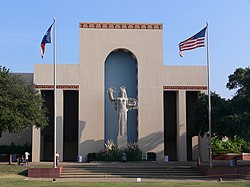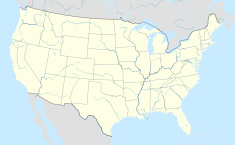Fair Park
|
Texas Centennial Exposition Buildings (1936--1937)
|
|

The Centennial Building in Fair Park
|
|
| Location | Bounded by Texas and Pacific RR, Pennsylvania, Second, and Parry Aves Dallas |
|---|---|
| Coordinates | 32°46′55″N 96°45′56″W / 32.78194°N 96.76556°WCoordinates: 32°46′55″N 96°45′56″W / 32.78194°N 96.76556°W |
| Area | 277 acres (1.12 km2) |
| Built | 1936 |
| Architect | Dahl, George L.; Et al. |
| Architectural style | Art Deco |
| NRHP Reference # | 86003488 |
| Significant dates | |
| Added to NRHP | September 24, 1986 |
| Designated NHL | September 24, 1986 |
 |
|
| Location | Fair Park, Dallas |
|---|---|
| Time zone | GMT -6 |
| Major events | 1984 Dallas Grand Prix |
| Length | 2.424 mi (3.901 km) |
| Turns | 14 |
| Lap record | 1:45.353, 133.300 km/h ( |
Fair Park is a 277-acre (1.12 km2) recreational and educational complex located in Dallas, Texas (United States). The area, which is immediately southeast of downtown Dallas, is registered as a Dallas Landmark and National Historic Landmark. Many of the buildings were constructed for the Texas Centennial Exposition in 1936.
Fair Park has been designated a Great Place in America by the American Planning Association.
The site was established as an 80-acre fairground on the outskirts of East Dallas for the Dallas State Fair in 1886. In 1904, after a fire and financial loss by the fair association, voters approved the "Reardon Plan,". It became Dallas' second public park and became known as "Fair Park."
An important figure in Fair Park's development was landscape architect and city planner George Kessler. In 1906, he was responsible for the first formal plan for the park influenced by the City Beautiful Movement. The City Beautiful Movement advocated well planned public spaces, tree-lined boulevards, monuments, public art, and fountains which would ‘beautify’ the city.
A milestone in Fair Park's history was 1936, when the Texas Centennial Exposition was held there. In preparation for the six-month event, the appearance of the park was dramatically altered by architect George Dahl and consulting architect Paul Cret. The park was transformed from an early 20th-century fairground into an Art Deco showcase. While many of the exposition's buildings were meant to be temporary, several have survived and have been restored to some extent. Over the years the park was expanded to its current 277 acres.
Fair Park was declared a National Historic Landmark in 1986 and in 1988 administration of the park was transferred to the Dallas Parks Department. Today, the cultural facilities and annual events attract an unsubstantiated estimate of 5 million visitors annually, the bulk of which attend during the 24-day State Fair of Texas.
...
Wikipedia


